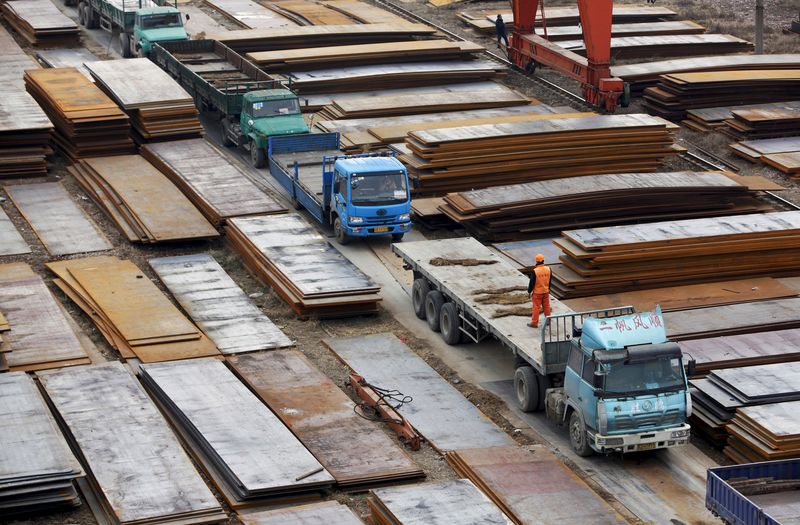By Manolo Serapio Jr
SINGAPORE (Reuters) - Chinese steelmakers are unwittingly helping the world's biggest iron ore miners tighten their grip on global production by demanding to pay for shipments of the raw material based closely on depressed spot prices.
The three largest and most profitable iron ore producers - Australia's Rio Tinto (AX:RIO) and BHP Billiton (AX:BHP), along with Brazil's Vale (SA:VALE5) - have been happy to sell at or near spot despite plunging iron ore prices, while their smaller rivals struggle to make money.
Smaller producers, including some higher cost Australian miners, want to continue with deals based on longer-term averages of prices, looking to hedge against further falls in the market.
But buyers in the world's largest consumer of iron ore are having none of it, with many Chinese mills demanding cargoes priced as close as possible to their delivery date.
"Pricing moves around with the steel mills. It used to be all based on a monthly average. Now you find the steel mills and traders perhaps trying to anticipate low points and suggesting quotation periods of maybe two weeks," said Morgan Ball, chief executive of Australian iron ore miner BC Iron Ltd (AX:BCI).
It makes sense for Chinese steelmakers now, as prices fall below $50 a tonne for the first time since at least 2008. But they run the risk of entrenching the market dominance of the Big Three ore suppliers, with fewer competitors surviving to offer contracts priced on longer averages if the market finally rebounds.
Rio and BHP did not respond to requests for comment, while Vale declined to say anything on the issue.
The industry in 2010 ditched a 40-year-old system of pricing contracts annually as it shifted to a more spot-based market, following similar developments years before in other commodities such as crude oil and natural gas.
The change came when iron ore prices were soaring, fuelled by a surge in China's steel consumption at the turn of the century. But prices have now shrunk to less than a quarter of highs of nearly $200 a tonne hit in 2011, with the world's No.2 economy set to grow at its slowest pace in 25 years.
"A mill today will prefer to buy cargo that is priced closer to the arrival time. Mills just want to go as much spot as possible because the market is coming down quite fast," said an iron ore trader in Shanghai.
SMALL, BUT NOT SO FLEXIBLE
Iron ore cargoes are usually priced based on an average, as measured by data providers such as Platts, for a particular period such as the past month.
With their low-cost structure, Rio, BHP and Vale have much more flexibility in pricing cargoes, but smaller miners are finding it tougher.
"We insist on having our quotation periods in place at the beginning of the month, so there is no last minute gaming. The reality is our price contracts are determined over a period of time and don't reflect one day," said BC Iron's Ball.
BC Iron became the first miner granted a 50-percent deferral on royalties by Western Australia as the mining state tries to provide relief to producers hit by the plunge in iron ore prices.
The steelmaking commodity slumped to $46.70 a tonne <.IO62-CNI=SI> last week, the lowest since data compiler The Steel Index began publishing prices in October 2008.
The price has dropped by nearly two-thirds since the start of last year as a global glut overwhelms a market reliant on Chinese demand, with low-cost miners resisting pleas to curb output.
"Miners need to accommodate this kind of (spot-based) pricing system, so they avoid defaults," said another Shanghai-based trader, suggesting some mills could be tempted to reject cargoes if they are priced too far away from spot.
